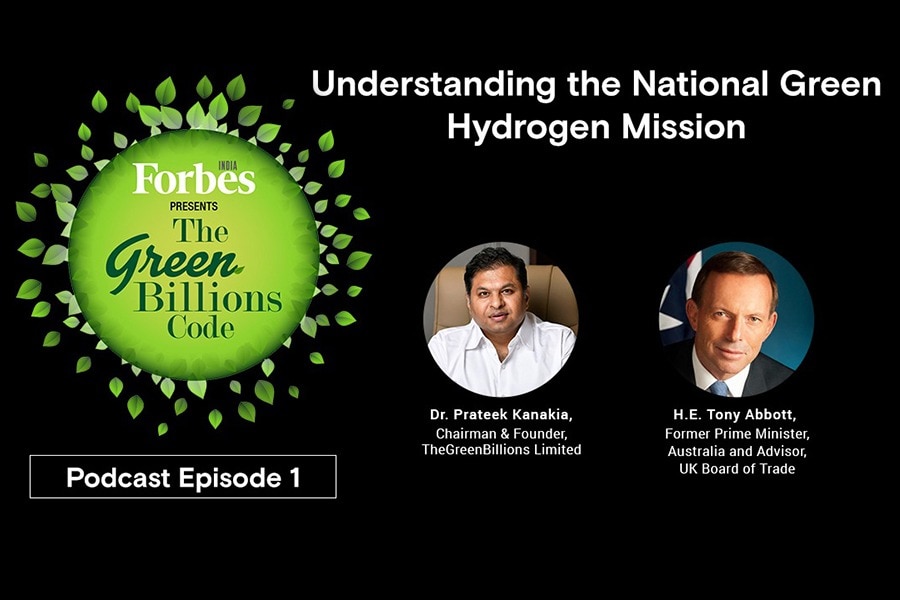Green hydrogen can be the holy grail in world's quest for sustainability: Tony A
Climate change goals need government and people's involvement in equal measure


 Mr Abbott, former Australian Prime Minister and currently, Advisor, UK Board of Trade, and Dr. Prateek Kanakia, Chairman & Founder, TheGreenBillions, delved deep into pertinent questions on sustainability and related aspects in the inaugural episode of the special podcast series “The Green Billions Code" presented by Forbes India.
Mr Abbott, former Australian Prime Minister and currently, Advisor, UK Board of Trade, and Dr. Prateek Kanakia, Chairman & Founder, TheGreenBillions, delved deep into pertinent questions on sustainability and related aspects in the inaugural episode of the special podcast series “The Green Billions Code" presented by Forbes India.
Sustainability will have to be entrenched into the core of every organisation—governments and businesses, growth models will have move from the conventional approach to policies that recognises the centrality of ecological balance as a non-negotiable priority, and science-based solutions such as green hydrogen could well help contain ecological erosion in rapidly developing economies such as India.
How can sustainability and the conversations on environmental, social and governance (ESG) are going to impact the Indian economy, the world economy, and businesses? How are businesses enabling this sustainability transition? Is green hydrogen a viable, scalable and alternative? What about the role and responsibilities of individuals?
Tony Abbott, former Australian Prime Minister and currently, Advisor, UK Board of Trade, and Dr. Prateek Kanakia, Chairman & Founder, TheGreenBillions, delved deep into these questions and related aspects in the inaugural episode of the special podcast series “The Green Billions Code" presented by Forbes India.
“The Green Billions Code" will dive deep into issues of sustainability and interconnected areas over 6-foccused episodes in conversations with top global and national experts who are the frontline of ushering in changes.
Breaking down a global path of milestones will entail transiting to a path of clean energy from predominantly polluting fuels in use currently, which will help cut down emissions significantly. Based on current evidence, how does one see this panning out?
“Obviously, we have got to reduce emissions as far and as fast as we can. But, on the other hand, particularly in a country like India, we have got to lift people out of poverty and bring them into a much better level of life. So, the challenge is to transition as quickly as possible to clean energy sources, while at the same time ensuring that we can get the lights on and countries like India and Australia," said Mr Abbott.
Plans and goals will have to be driven down through governments to companies through municipalities, and eventually to individuals.
“Everyone should contribute ideas to come together, to collaborate, inculcate habits, since the time of kindergarten. Breaking down the responsibilities to the individual level would be the way forward to bring this whole transition. I wish to see this change at the bottom of the pyramid level," Dr Kanakia said.
There"s also a macro-economic aspect, which may require redefining old growth models to strike an equilibrium between ecology and economics.
“I think it is important to get the balance right. And it"s easy for people in countries like Australia to talk about sustainable growth because we already have a high standard of living. And we are imposing lower standards of living on countries like India, because of our own environmental concerns. That"s no good thing. There"s a long way to go. At the end of the day, if you"re a poor farmer, or a poor factory worker in India, you want a better standard of living, you want more money in your pocket, and you want to be able to get a better education and better health services for your kids. And that does require wealth. We have to be careful at conferences like Davos, assuming that everyone thinks like us, and assuming that everyone has the same access to financial power and technological advances that we do," Mr Abbott said.
Earlier this year, the government approved the National Green Hydrogen Mission (NGHM), with an initial outlay of Rs 19,744 crore. The NGHM is being billed as a programme that can potentially make India a global hub for producing and exporting green hydrogen. While the opportunities are evident, what are the potential challenges?
“We have to make this energy transition and adopt hydrogen in a longer term and make it viable. It will still require a lot of support from the government. We need some kind of provision for viability gap funding. Production of hydrogen is one thing. But, we still need to build upon the logistics, the storage and look after other issues, the safety standards. By just calling the hydrogen green and not making it viable, we need to achieve cost efficiency," said Dr Kanakia.
The pages slugged ‘Brand Connect’ are equivalent to advertisements and are not written and produced by Forbes India journalists.
First Published: Mar 28, 2023, 17:51
Subscribe Now